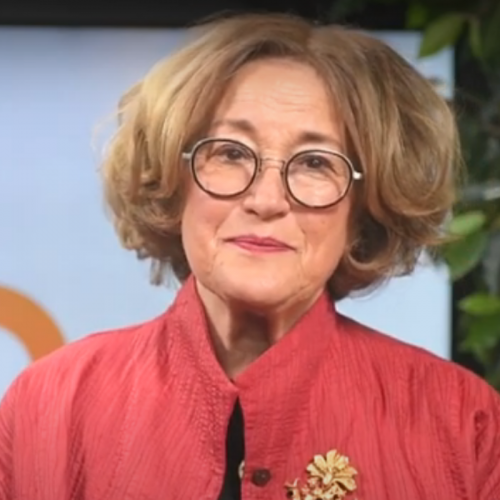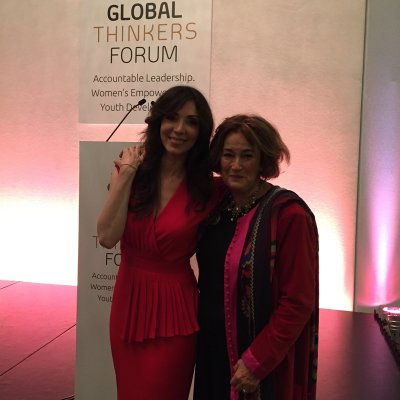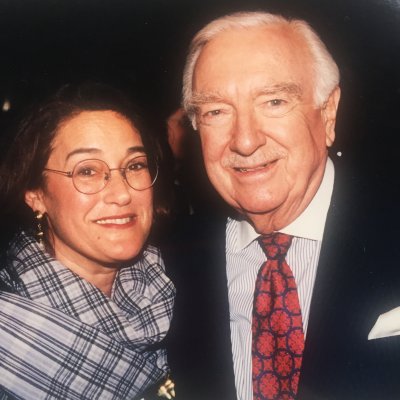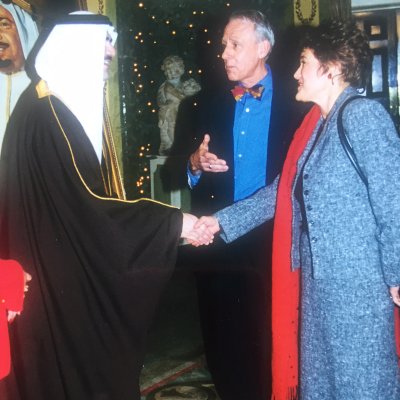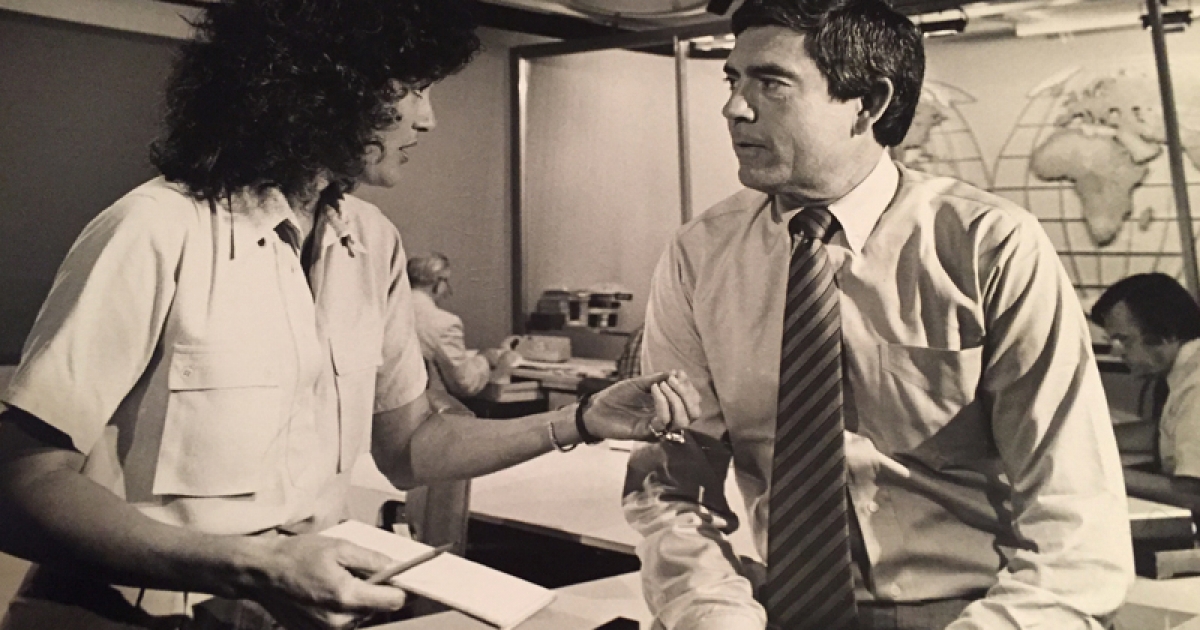“Leading a Life of Inspiration”
Geraldine Sharpe Newton is a global communications advisor with a unique transatlantic career and an amazing life journey. She honours us by sharing some of her learnings, insights and experiences. A combination of fearlessness, determination and a strong human element is what makes a charismatic leader. Geraldine is certainly one of those few.
I was lucky, born at a time when women had started to talk, think and be leaders. War had been one of the triggers. An iconic image of the California shipyard worker known as ‘Rosie the Riveter’ rode a crest of that first wave.
Although it was never spoken of in our house, as I write I recall there being a photograph of my mother in a scarf and blue overall, looking just like Rosie the Riveter.
Then these women, in various uniforms, came in hundreds. Nurses were in the vanguard.
There was no explicit talk of equality, but it was in the air.
My world was full of the names of great women, each carried a part of the message, we are equal. Eleanor Roosevelt, Betty Friedan, Congresswoman Bella Abzug, Gloria Steinem, Shirley Chisholm, and so many more, brought women into that mainstream.
I spent time with Steinem and she taught me how to recognise leadership capabilities in ones-self. I met her recently in London and thanked her. Assume nothing, about leadership, she said and, almost without trying too hard, you will discover that the skills of Leadership develop. They did and soon it began to feel like a biological offshoot of my personality.
But back then I didn’t have a true sense of leadership. Only how I might, achieve what I cared about. Passion was the fuel.
I was an activist. Did I realise it -not really. I was a Mother with two little ones living in the suburbs, and being discovered by the local political party as a persuasive communicator, was a useful combination.
"Leadership is a set of beliefs and styles set against experience. Quite simply you have to allow experience to seep into your soul. It works, but it takes a few years"
I was hired to get out the vote by the local Democratic National Committee in 1972. It was a lost fight as Ricard Nixon soundly won over George McGovern. However I discovered I could inspire and excite people from different communities and backgrounds.
That lead to being asked to chair the local National Women’s Political Caucus in Pittsburgh; meeting all those great women leaders, campaigning for the Equal Rights Amendment, against the formidable anti-equality Phyllis Schally. We didn’t make it happen in the 70’s and it still hasn’t happened.
It was then I made the difficult and frightening decision to leave my marriage. I could not do what was expected of me at that time. The safe predictable life I was to have wasn’t going to be enough. It remained for decades a painful decision and the guilt I experienced was huge.
So I went to New York City believing in what they say, ‘make it there and you‘ll make it anywhere’.
I had acquired credentials, a track record in politics, journalism, television news, radio and the beginning of my own networks. Being part of the women’s movement at that very sensitive time, meant that we were being heard. Opportunities were opening.
Getting jobs, pushing on in them and staying hungry was the basic underpinning of experience. I wanted the best for my son and daughter as they were part of this new world that I had thrown them into.
That instinct, chance taking, if you want to describe it as that, never left me and underpinned my leap a decade later to London. Once I had accepted listening to my own internal voice and doing my homework, experiencing the change in my world of the media I knew it was time for another leap.
During all this growing time I was leading but in many different guises, and it always meant bringing others along. There were some great women and some clever men. It quickly became clear that I grew to know leadership almost ‘biologically’ when I had it.
It’s fair to say we know leadership when we see it or ‘feel’ it in the room, in the same way that we certainly know it when we’re working for it.
The trick though, is to avoid using it unnecessarily. It is not a weapon. Our world is full of candidates for leadership who were harsh and terrifying. It was harder than I ever imagined. And above all else, whilst I knew what I had, I never referred to it by name.
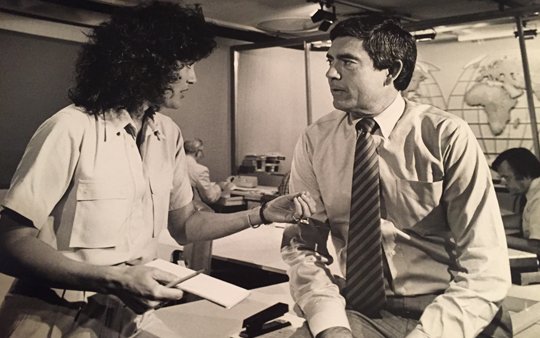
From the point of view of the women’s groups that I was part of in Pittsburgh Pennsylvania, through local TV and later. Through my jobs in Public Relations at Burson Marsteller, New York, the launch of The Economist and at Simon & Schuster publishing house, then the CBS News PR operation during the Cronkite Rather transition.
Coming to London to lead Communications at ITN, and a few years later becoming a Director at the World Wide Fund for Nature, and following that as Senior VP of Turner Broadcasting’s Communications operation outside the Americas. At each, was in charge and although in each case differently, I led the charge, I never talked about being a leader. I spoke about building effective teams, collaborative efforts.
Not always did I command and exercise that leadership. So often it just wasn’t necessary.
What I discovered, early in work, was that not all leaders are real leaders. Some people have experience way beyond their position in the hierarchy and although not actually in charge, these people should be listened to. On the other hand, some leaders just have a lot to say, but little worth following. Nowhere was that more starkly drawn than at network Television in New York.
At CBS in New York I swam in a vast pond of brilliant inspiring people, all leaders, people who knew when to bark, when to encourage, when to coax. Each knowing the limitations of others.
After much discussion, my suggestion that Rather should wear a cardigan under his News-Anchor suit, to soften his image was accepted. I was then told to take the lead on this, I was allowed to persuade Dan and that was that. It worked and we remain friends. It could have been the end for me. One of those leadership tripwires. But this is an example of where leadership emanates from somewhere other than the Big Boss.
In no particular order, I will give you and outline, a sense of some of the ingredients of leadership. Be assured they are ingredients common to men and women and you don’t have to be special to own them.
In no particular order, number one, and the general catch-all is ‘self-awareness’, know what you are capable of. Sometimes we have just a glimmer of our capabilities. Try to know your faults and strengths. Then make sure you handle them both, carefully whilst listening to others.
Getting the job done must be top of the list, and never leave anything to tomorrow. Justice in the workplace, honour, understanding and kindness, all jostle for leadership priority. Sometimes they clash.
Be doggedly aware of what you’re good at now and what you know you will never be good at. A prosaic example would be, spelling. I or others always check mine.
We often believe that since we are ‘swimming’ in a particular business that it imbues us with its required qualities. Don’t be fooled. Leadership is not a device, an app or a system. Click, Apply, Move on. We have all come from different schools, family structures, all of which has been niggling at us long before the days of actual work. So, I was never sure.
Within that we have to be ‘realistic’, there must also be a touch of ‘introspection’, ‘self-examination’ and you must ‘know your limits’.
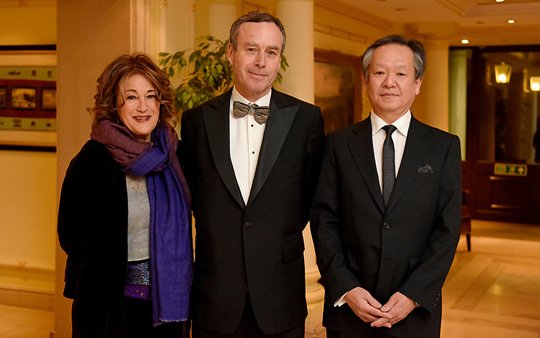
There must also be inspiration. Look back at those good ‘bosses’ and try to be honest about what inspiration you got from them. Who inspired you? I think we always know. It is often not an explosive inspiration. Most often it is subtle, calm, confident capability, that carries the ‘inspiration’ gene.
One must also always be brutally honest with oneself and with everyone you encounter along the way. One day you might need them again. And my final realisation about leadership hangs on this.
A while ago, when I was at ITN and my partner Peter was at CBS, he and three colleagues were captured and vanished in IRAQ during the early part of the first war. This experience changed me. It hardened my realisation that the campaign to find them and bring them back needed every bit of what I’d learnt since Gloria Steinem triggered my self-awareness.
The campaign brought in everyone I’d known and worked for and more. The journey took me to meetings in places and with people otherwise inaccessible. Doors opened, letters were written, phone calls were taken, meetings arranged. I was heard, I was helped and I felt fearless. I was being myself, my American self, mixed with my British self, and my honest direct self. This was an offshoot of my journey towards being a leader. I cherry-picked what I needed.
When it ‘turned out fine’, as the music hall line goes, and they came home, my great, inspirational Editor at ITN, Alastair Burnett sent me a flattering note. He said, I had ‘English Bottle’. I was proud of that compliment.
In fact, what I, we, everybody had done was tap into that ability to lead without noise and fuss, just behaving honestly and correctly and instinctively following advice.
They cannot be taught or measured, rather they are generated or perhaps inspired from within, over time, as a result of interaction with others.
It is a gift and so often it comes from others. They will quickly tell us, although usually not in so many words, if we are in any way inspirational.
So, above all else, avoid assumptions based on job title. I can tell you about top leadership jobs I’ve had in New York and in London, but in only a few can I honestly claim I was a complete or absolute leader. What I have realised, however is that with a few ounces of modesty, you will discover that others will gently imbue you with the magic of leadership. It will happen and people will follow you. It will work and you will know.
My story is designed, much less to offer a prescriptive, ‘How-To’ road-map for leadership, more to give younger, aspiring members, a sense of the modest qualities it requires. Quite simply you have to allow experience to seep into your soul. It works, but it takes a few years.
Published: 08/03/2018


